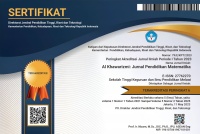PENINGKATAN HASIL BELAJAR MATEMATIKA PADA MATERI PENJUMLAHAN BERSUSUN MELALUI MODEL PEMBELAJARAN PROBLEM BASED LEARNING DENGAN BANTUAN MEDIA PAPAN PENJUMLAHAN PADA SISWA KELAS III UPTD SDN 192 BARRU
Abstract
Abstrak
Tujuan penelitian ini adalah untuk mengetahui peningkatan hasil belajar matematika pada materi penjumlahan bersusun melalui model Problem Based Learning  dengan bantuan media Papan Penjumlahan di kelas III UPTD SDN 192 Barru. Penelitian ini menggunakan Penelitian Tindakan Kelas (PTK) yang dikemabangkan oleh Kemmis dan McTaggart, yang terdiri dari empat tahap: perencanaan, tindakan, observasi, dan refleksi. Data penelitian dikumpulkan melalui wawancara, observasi, dan tes. Penelitian ini dilaksanakan di UPTD SDN 192 Barru dengan melibatkan 13 peserta didik sebagai responden. Indikator keberhasilan penelitian ditetapkan jika 85% dari seluruh peserta didik kelas III mencapai Kriteria Ketuntasan Minimal (KKM) yaitu 70. Hasil pra siklus menunjukkan hanya 3 peserta didik (23%) yang mendapatkan nilai di atas KKM. Pada siklus I, terdapat 4 peserta didik (31%) yang mencapai KKM, sedangkan pada siklus II, jumlahnya meningkat menjadi 11 peserta didik (85%) yang mencapai KKM. Dengan demikian, terjadi peningkatan sebesar 8% dari hasil pra siklus ke siklus I, dan 54% dari siklus I ke siklus II. Berdasarkan hasil penelitian, terdapat peningkatan keseluruhan sebesar 62% dari pra siklus hingga siklus II. Oleh karena itu, dapat disimpulkan bahwa penggunaan model Problem Based Learning dengan bantuan media papan penjumlahan efektif dalam meningkatkan hasil belajar matematika pada materi penjumlahan bersusun di kelas III UPTD SDN 192 Barru.
Kata Kunci: Matematika, Pembelajaran Berbasis Masalah, Papan Penjumlahan
Abstract
The purpose of this study was to determine the improvement of mathematics learning outcomes on stacked addition material through the Problem Based Learning learning model with the help of the Addition Board media in class III UPTD SDN 192 Barru. This research uses Classroom Action Research (PTK) developed by Kemmis and McTaggart, which consists of four stages: planning, action, observation, and reflection. Research data were collected through interviews, observations, and tests. This research was conducted at UPTD SDN 192 Barru involving 13 students as respondents. The research success indicator was determined if 85% of all third grade students reached the Minimum Completion Criteria (KKM) of 70. The pre-cycle results showed that only 3 students (23%) scored above the KKM. In cycle I, there were 4 learners (31%) who reached the KKM, while in cycle II, the number increased to 11 learners (85%) who reached the KKM. Thus, there was an increase of 8% from pre-cycle results to cycle I, and 54% from cycle I to cycle II. Based on the results of the study, there was an overall increase of 62% from pre-cycle to cycle II. Therefore, it can be concluded that the use of the Problem Based Learning learning model with the help of the addition board media is effective in improving mathematics learning outcomes in the material of stacked addition in class III UPTD SDN 192 Barru.
Keywords:Â Math, Problem Based Learning, Addition Board
Downloads
Published
How to Cite
Issue
Section
Citation Check
License
Copyright (c) 2025 AL KHAWARIZMI: Jurnal Pendidikan Matematika

This work is licensed under a Creative Commons Attribution-NonCommercial-ShareAlike 4.0 International License.
Authors who publish with this journal agree to the following terms:
1. Authors retain copyright and grant the journal right of first publication with the work simultaneously licensed under a Creative Commons Attribution License that allows others to share the work with an acknowledgement of the work's authorship and initial publication in this journal.
2. Authors are able to enter into separate, additional contractual arrangements for the non-exclusive distribution of the journal's published version of the work (e.g., post it to an institutional repository or publish it in a book), with an acknowledgement of its initial publication in this journal.
3. Authors are permitted and encouraged to post their work online (e.g., in institutional repositories or on their website) prior to and during the submission process, as it can lead to productive exchanges, as well as earlier and greater citation of published work.






